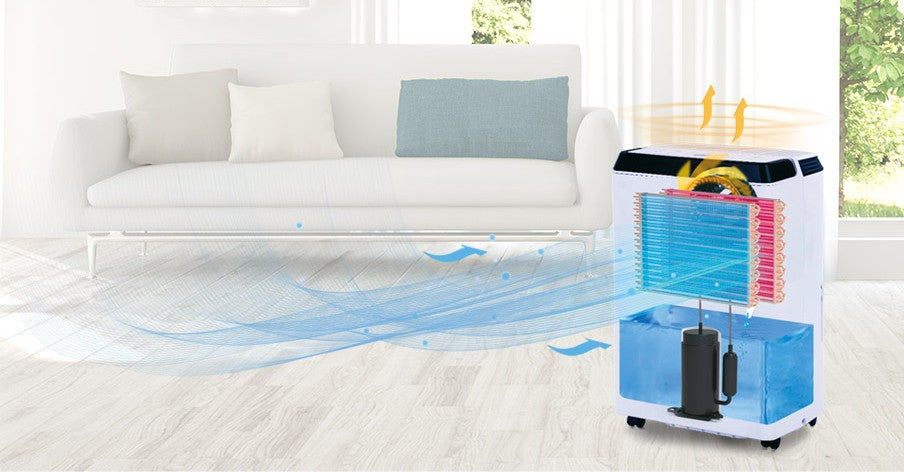Imagine stepping into a room that feels like a sauna, where the air is thick and sticky, making it hard to breathe and relax. You might be looking for a solution to turn your living space into a cool, comfortable haven.
You’ve probably heard about dehumidifiers and wondered, “Can a dehumidifier cool a room? ” Your curiosity is justified, and this question is more common than you might think. By understanding what a dehumidifier can really do, you can transform your home environment and enhance your well-being.
You will discover the true power of dehumidifiers, how they can impact your space, and whether they can truly bring down the temperature in your room. You’ll also uncover expert insights and tips that might surprise you, helping you make informed decisions for a more comfortable living experience. Dive in to find out if this device is the secret to achieving the perfect balance of cool and dry in your home.
How Dehumidifiers Work
Understanding how dehumidifiers work can transform your approach to managing indoor air quality. Many people wonder if these devices can actually cool a room. Let’s dive into the mechanics of dehumidifiers and see how they affect your room’s temperature.
Dehumidifiers are designed to remove excess moisture from the air. They pull in humid air and pass it over cold coils. This process causes the moisture to condense, turning into water droplets that are collected in a reservoir. The dry air is then expelled back into your room.
Imagine stepping into a room on a hot summer day. It’s not just the heat that makes you uncomfortable; it’s the sticky, heavy humidity. Dehumidifiers take the edge off by reducing that clammy feeling. They don’t lower the temperature like an air conditioner, but they make the air feel cooler and more comfortable by eliminating dampness.
Do Dehumidifiers Cool The Air?
While dehumidifiers don’t actually lower the room temperature, they create an environment that feels cooler. When the humidity drops, your body’s natural cooling process improves. Sweat evaporates more easily, making you feel cooler even if the thermometer doesn’t show a change.
Think about the last time you were in a humid place. You might have felt hot despite a moderate temperature. That’s because humidity affects your perception of heat. Dehumidifiers help by ensuring that your living space feels less oppressive.
The Impact On Your Comfort
Using a dehumidifier can significantly enhance your comfort during warmer months. You might notice that you can turn down your air conditioning or even switch it off sometimes. This can lead to energy savings and a more pleasant living environment.
Have you ever felt relieved when stepping into a dry room after being outside in sticky weather? The air seems fresher, and your skin isn’t sticking to your clothes. That’s the kind of relief a dehumidifier can offer, making it a valuable addition to your home.
Is A Dehumidifier Right For You?
Consider your living space and climate. If you live in a place with high humidity, a dehumidifier can be a game changer. It can help you feel cooler without cranking up the AC, potentially lowering your energy bills.
Ask yourself: Do you struggle with humidity more than heat? If the answer is yes, investing in a dehumidifier might be worth it. It can create a more comfortable space, making your home feel inviting even on the hottest days.
Ultimately, while dehumidifiers don’t cool a room in the traditional sense, their ability to improve comfort by reducing humidity makes them a smart choice for many households. Would you consider adding one to your home?
Cooling Effect Of Dehumidifiers
Ever wondered if a dehumidifier could cool your room? While it might not replace your trusty air conditioner, a dehumidifier does create a sensation of cooler air by removing excess moisture. When humidity is reduced, the air feels fresher and more comfortable. Let’s delve into the fascinating cooling effect of dehumidifiers and understand why they might be your next favorite appliance.
Perception Of Cooler Air
Have you ever stepped into a room with high humidity and instantly felt warmer? That’s because high humidity makes the air feel sticky and oppressive. By using a dehumidifier, you can remove the moisture, leaving the air crisper and lighter.
Imagine walking into a room where the air doesn’t cling to your skin. A dehumidifier can create this effect, making you feel cooler even if the temperature hasn’t changed. It’s like a breath of fresh air, especially during those muggy days.
Many users report feeling more comfortable and cooler after using a dehumidifier. It’s all about how your body perceives the air around you.
Temperature Vs. Humidity
Temperature and humidity are closely linked, but they aren’t the same thing. A dehumidifier won’t lower the temperature, but it will reduce the humidity. This can make a room feel cooler because dry air allows sweat to evaporate more effectively.
Consider this: a room at 75°F with low humidity can feel cooler than a room at the same temperature with high humidity. It’s the moisture in the air that affects your comfort level.
Have you ever noticed how hot and sticky it feels before a storm? That’s high humidity at play. By removing the moisture, a dehumidifier can help your air conditioner work more efficiently, potentially reducing energy costs.
So, the next time you feel hot and bothered, ask yourself—could a dehumidifier improve your comfort? You might find the answer surprising.
Factors Affecting Cooling
Dehumidifiers remove moisture, indirectly making a room feel cooler. They enhance air conditioning efficiency by reducing humidity. While not traditional cooling devices, they support a more comfortable environment.
Factors Affecting Cooling Understanding how a dehumidifier affects room cooling is essential. The impact varies based on several factors. These factors include room size, layout, and dehumidifier capacity. Let’s explore these elements to grasp their significance.
Room Size And Layout
Room size plays a key role in cooling efficiency. A larger room requires a more powerful dehumidifier. Smaller spaces need less energy to remove humidity. The layout also matters. Open spaces allow better air circulation. Closed spaces might trap moisture. Furniture placement can block airflow. This affects how well a dehumidifier works.
Dehumidifier Capacity
Capacity determines a dehumidifier’s effectiveness. Higher capacity units extract more moisture. They work better in large or damp areas. Smaller units suit compact spaces. Capacity is measured in pints per day. Choose the right size for optimal results. Misjudging capacity leads to poor performance. It can either underperform or waste energy.
:max_bytes(150000):strip_icc()/GettyImages-1078226676-9eca45d46a04497d8c263aa273ca987c.jpg)
Comparing Dehumidifiers And Air Conditioners
When it comes to making your room comfortable, you might wonder about the roles of dehumidifiers and air conditioners. Both have unique functions, but do they cool your space in the same way? Understanding their differences can help you make the best choice for your needs.
Functional Differences
Air conditioners and dehumidifiers serve different primary functions. An air conditioner cools the air by removing heat and moisture, creating a chilled atmosphere. It’s like stepping into a refreshing breeze on a hot day.
On the other hand, dehumidifiers focus on removing moisture from the air. While they can make a room feel cooler by reducing humidity, they don’t actually lower the air temperature. Imagine a muggy day transformed into a dry, comfortable evening.
Consider how each appliance impacts your comfort level. Do you need a drop in temperature or just relief from oppressive humidity?
Energy Consumption
Energy consumption is a critical factor in choosing between these appliances. Air conditioners typically consume more electricity because they actively cool the air. This can lead to higher energy bills, especially during peak usage.
Dehumidifiers, however, often use less energy since their primary function is moisture removal. This can be a more economical option if you are focused on reducing humidity rather than lowering temperature.
Think about your energy goals. Are you looking to save on costs while maintaining comfort?
These insights are not just theoretical. During a sweltering summer, I opted to use a dehumidifier in my living room. While the air wasn’t cooler, the reduced humidity made it feel more bearable, and my energy bill was pleasantly lower. So, what matters more to you—cool air or lower humidity?
Benefits Beyond Cooling
While a dehumidifier primarily removes moisture, it offers more advantages. These benefits extend beyond cooling alone. A dehumidifier improves the environment in your home.
Improved Air Quality
Dehumidifiers enhance the air you breathe. They reduce allergens and dust mites. Drier air means fewer respiratory problems. Fresh air promotes better health for everyone. Breathing becomes easier and more comfortable. Many people notice fewer allergy symptoms.
Mold And Mildew Prevention
High humidity breeds mold and mildew. Dehumidifiers help prevent these unwanted guests. They lower moisture levels, hindering mold growth. Mold can damage your home. It also poses health risks. By using a dehumidifier, you protect your space. Your home stays cleaner and safer for your family.

Optimal Use Of Dehumidifiers
Understanding the optimal use of dehumidifiers can enhance comfort in your home. A dehumidifier doesn’t cool a room like an air conditioner. Instead, it removes moisture, which makes the air feel cooler. Proper use can make a significant difference in achieving a comfortable environment.
Placement And Settings
Position the dehumidifier in the center of the room for best results. This placement allows even distribution of air and moisture removal. Ensure that the area surrounding the dehumidifier is free of obstructions. Adjust the settings to maintain the desired humidity level. Lower settings usually require less energy. Regularly check the water tank and empty it as needed.
Combining With Other Cooling Methods
Combine a dehumidifier with fans or air conditioners to maximize cooling. Fans help circulate the air, enhancing the dehumidifier’s effectiveness. Air conditioners cool the room while the dehumidifier reduces humidity. This combination can create a pleasant atmosphere in hot and humid conditions. Use window coverings to block sunlight and reduce heat gain. This can further improve the cooling effect.

Frequently Asked Questions
Will A Dehumidifier Make A Room Cold?
A dehumidifier doesn’t cool a room. It removes moisture, making the air feel cooler and more comfortable. The device itself emits some heat, which can slightly raise the room’s temperature. It’s ideal for improving air quality and reducing humidity.
Can You Use A Dehumidifier In A Hot Room?
Yes, you can use a dehumidifier in a hot room. It removes excess moisture, improving comfort. Dehumidifiers help reduce humidity, preventing mold and mildew growth. Ensure proper ventilation for efficient performance. Choose a dehumidifier suitable for your room size to maximize effectiveness.
Can A Dehumidifier Be Used As An Air Cooler?
A dehumidifier cannot be used as an air cooler. It removes moisture from the air, reducing humidity. Air coolers lower the air temperature by using water evaporation. While both improve comfort, they serve distinct functions and are not interchangeable.
Can I Use A Dehumidifier As An Ac?
A dehumidifier cannot function as an air conditioner. It reduces humidity but doesn’t cool the air significantly. Use an air conditioner for effective cooling. Both devices have different purposes and mechanisms.
Conclusion
A dehumidifier removes excess moisture from the air. It makes a room feel cooler. But it doesn’t lower the temperature like an air conditioner. Dry air feels more comfortable and refreshing. This can create the illusion of a cooler room.
For a noticeable temperature drop, use an air conditioner. Dehumidifiers are great for reducing humidity levels. They improve comfort and air quality. Consider both devices for best results. This ensures a pleasant and cool environment. Perfect for those hot and sticky days.


